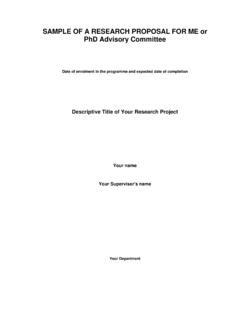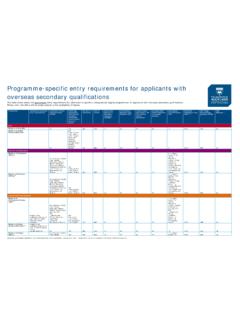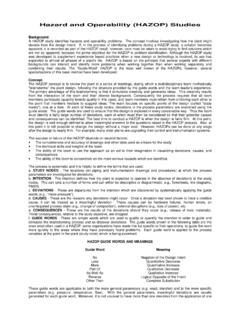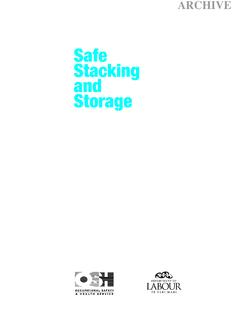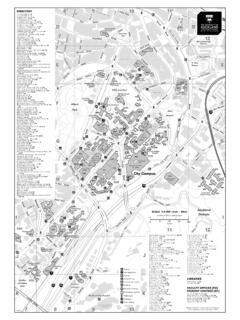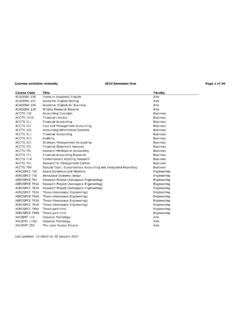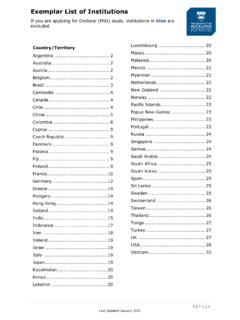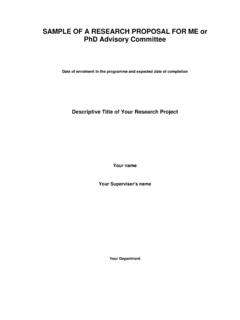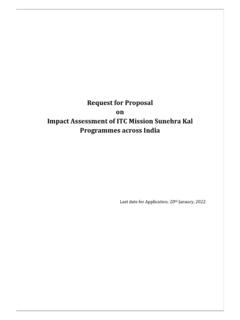Transcription of Answers to frequently asked questions about thematic analysis
1 Answers to frequently asked questions about thematic analysis Reflexive TA | the basics What s the difference between a code and a theme? What s the difference between a subtheme and a theme? What s the difference between a domain summary and a theme? What is a central organising concept and why is it important in thematic analysis ? Reflexive TA in context: contrasts with other types of thematic analysis What s the difference between reflexive thematic analysis ( , Braun & Clarke ) and other approaches? What s the difference between thematic coding and TA? Reflexive TA in context: contrasts with other analytic approaches What s the difference thematic analysis and IPA?
2 What s the difference between thematic analysis and grounded theory? What s the difference between constructionist thematic analysis and discourse analysis ? What s the difference between thematic analysis and ( qualitative ) content analysis ? Doing Reflexive TA I ve collected five interviews is that enough for a TA? Why are we critical of the notion that themes emerged from data? Why don t we advocate multiple-coders and inter-rater reliability for reflexive TA? How many themes should I have? Are latent codes/themes better than semantic ones? Reflexive TA: What is it good for? What types of data is reflexive thematic analysis suitable for?
3 What types of research questions is reflexive thematic analysis suitable for? Quality in reflexive TA research What are some of the common problems I should avoid when using reflexive TA? How do I know if I have done a good reflexive thematic analysis ? Should someone else check my coding? Should I use numbers when reporting themes? Teaching and supervision Should I teach my students thematic analysis ? Is thematic analysis sophisticated enough for a doctoral project? Reflexive TA| the basics What s the difference between a code and a theme? What s the difference between a subtheme and a theme? What s the difference between a domain summary and a theme?
4 What is a central organising concept and why is it important in thematic analysis ? What s the difference between a code and a theme? A theme captures a common, recurring pattern across a dataset, clustered around a central organising concept. A theme tends to describe the different facets of that singular idea, demonstrating the theme s patterning in the dataset. Codes tend to be more specific than themes. They capture a single idea associated with a segment of data, and consist of pithy labels identifying what is of interest in the data (in relation to the research question). Codes can be conceptualised as the building-blocks that combine to create themes so multiple codes typically are combined to create themes, during the process of TA.
5 Top What s the difference between a subtheme and a theme? A theme captures a common, recurring pattern across a dataset, organised around a central organising concept. A theme tends to describe the different facets of a pattern across the dataset. A subtheme exists underneath the umbrella of a theme. It shares the same central organising concept as the theme, but focuses on one notable specific element. Subthemes generally should be used sparingly, only when there is one particular element of a theme that has a particular focus, is notable, and/or is particularly important for the research question. Through naming and analysing a specific subtheme, that aspect of the theme becomes particularly salient.
6 Top What s the difference between a domain summary and a theme? The difference between a theme and a domain summary is a source of frequent confusion in much published TA research. A domain summary is a summary of an area (domain) of the data; for example, a summary of everything the participants said in relation to a particular topic or interview question. Unlike themes, there isn t anything that unifies the description of what participants said about this topic there is no underlying concept that ties everything together and organises the analytic observations. In our approach to TA, themes are conceptualised as patterns in the data underpinned by a central concept that organises the analytic observations; this is rather different from a domain summary, and the two should ideally not be confused when using our approach.
7 More simply put, a theme identifies an area of the data and tells the reader something about the shared meaning in it, whereas a domain summary simply summarises participant s responses relating to a particular topic (so shared topic but not shared meaning). To make things complicated, some approaches to TA do conceptualise themes as domain summaries this conceptualisation of themes is evident in both coding reliability approaches (see Boyatzis, 1998; Guest et al., 2012) and codebook approaches, such as template, framework and matrix analysis . Sometimes the confusion between domain summaries and themes is simply an issue of poorly named themes the theme itself is a conceptually founded pattern, but the theme name does not reflect this.
8 Experiences of Y or Benefits of X are classic examples of domain-summary type theme names. These theme names identify that, for example, benefits of X was an important area of the data in relation to the research question(s), but they don t communicate the essence of this theme; they don t tell the reader something specific about these benefits and what underlying concept underpinned what the participants had to say about the benefits of X. Literature To understand more about the differences between domain summaries and fully realised themes, we recommend the following three papers: Connelly, L. M. & Peltzer, J. N. (2016). Underdeveloped themes in qualitative research: Relationships with interviews and analysis .
9 Clinical Nurse Specialist, January/February, 51-57. DeSantis, L. & Ugarriza, D. N. (2000). The concept of theme as used in qualitative nursing research. Western Journal of Nursing Research, 22(3), 351-372. Sandleowski, M. & Leeman, J. (2012). Writing usable qualitative health research findings. qualitative Health Research, 22(10), 1404-1413. We have written about this in this chapter: Clarke, V., Braun, V., Terry, G & Hayfield N. (2019). thematic analysis . In Li amputtong, P. (Ed.), Handbook of research methods in health and social sciences (pp. 843-860). Springer. We discuss it in this lecture. Top What is a central organising concept and why is it important in thematic analysis ?
10 A central organising concept captures the essence of a theme. It is an idea or concept that captures and summarises the core point of a coherent and meaningful pattern in the data. If you can identify the central organising concept of a theme, you can capture the core of what your theme is about . If you cannot do this, your theme may lack coherence. Top Reflexive TA in context: contrasts with other analytic approaches What s the difference between reflexive thematic analysis ( , Braun & Clarke ) and other approaches? What s the difference between thematic coding and TA? What s the difference between reflexive thematic analysis ( , Braun & Clarke ) and other approaches?
